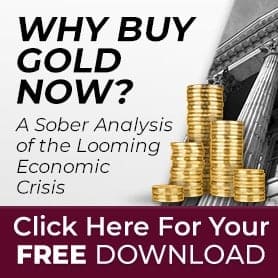- Recording this podcast on Monday afternoon; the stock market closed about an hour ago, and the stock market was up over 100 points today, but the more dramatic days happened on Thrusday and Friday
- Despite the initial euphoric increase in the stock market that greeted the Fed’s highly anticipated quarter-point rate hike on Wednesday the market tanked on Thursday and Friday, down over 600 points
- The most significant part of the sell-offs is that on both days the markets closed on the lows for the day
- The Fed is getting dangerously close to losing what remains of its credibility
- The Credibility Bubble might be the first to deflate in this recession
- The Fed has been saying that the economy would be strong enough for a rate hike by the end of the year, so if they did not raise rates in December it would have been an admission that they were wrong
- The Fed raised rates even though the economic data showed that, based on their own criteria, they should not have done it
- More and more people are questioning whether the Fed has made a policy mistake
- Look at the data that came out since the rate hike:
- On Friday we got the PMI Flash Services Index came out at 53.7 – last month it was 56.5
- The Kansas City Fed Manufacturing – last month was +1 and December was -8
- Today we got the Chicago Fed National Activity, expected to be +.15 for November, instead it came out at -.3 and they revised down the prior month to -.17
- With all the horrible economic data, horrible retail sales, horrible corporate earnings it is obvious that the U.S. economy is heading toward recession
- As the economy slows and the Fed is forced to admit it was wrong, there goes it’s credibility
- This coming collapse is the culmination of decades of bad monetary policy
- Where we really went off the rails was in the Greenspan era, which sent us off on this trajectory of loose money
- Yellen admitted in her recent press conference that they will still roll over all the maturing bonds and re-investing all the interest on those bonds so the Fed’s balance sheet will continue to grow
- The bubble economy will blow up in her face, though, because the market will not be able to withstand a sustained correction and it will require unprecedented quantitative easing that will result in failure
- I wanted to discuss on this podcast an Sunday eening article on CNBC, “The Peter Meter” that really took me to task on my gold predictions
- They did not look at any of my many accurate predictions; they focused on the ones that haven’t worked out
- They singled me out for criticism on an 2012 interview I did with them when gold was at $1,700 and I said it could go to $5,000. I never put a time horizon on my prediction, but this was labled as one of the worst
- Back in 2005 I did an interview with Mark Haynes when gold was still below 500 and it more than tripled from that price
- You can see articles I wrote recommending gold back in 2003 when gold was even below 500.
- It is true that I did not see the near 40% correction in the price of gold because I thought the market would see past the bubbles
- CNBC claims my prediction to be among the least prescient ever made
- Twice in the last 15 years the U.S. stock market lost more than half its value
- Anybody who was on CNBC in 1999 and recommended the stock market, which was about every guest, made a worse prediction than that
- Every guest on CNBC in 2007 and 2008 and recommended the stock market made a worse prediction
- What about all the dot com stocks that went to zero?
- Obviously, CNBC is singling my gold prediction out above these other significantly less prescient predictions
- If you look at all the predictions on CNBC over the years, my predictions have been better than most.
- The CNBC article also took me to task on my view that quantitative easing would not help the economy, but only create asset bubbles. That criticism will be proven wrong, as the the economy has not revived under QE.
- I had been saying until very recently that the Fed would not raise rates, and the only reason I felt they would raise rates in December was that the Fed changed its narrative from “data-driven” to “faith in the recovery”. My analysis still has not changed. Our economic data shows we are heading toward recession, which gives no credence to the Fed’s faith in the recovery.
Podcast: Download










